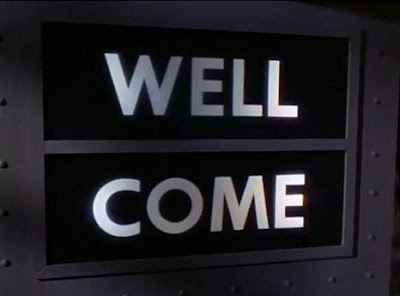I mean, The Prisoner isn't my favourite series of all time - I have only watched it all in the last five-or-so years and there are a number of series that have been with me for so long (e.g Doctor Who, Blackadder) that I don't think they can ever be overtaken.
Ah well, I'll take a deep breath, and here goes...
It's the music, I think, that makes it. I've seen plenty of films and TV programmes that are weird and wonderful - Aeon Flux, Sapphire and Steel, to name but two - but the music in Fall Out adds so much to the experience of watching it that even when it threatens to be a string of nonsense robbing a magnificent series of a coherent ending, the music is there saying "this is it." I love the music.
Once Upon A Time is a tough episode to follow. The performances by McGoohan and Leo McKern were sublime, and it culminates in Number 2 dying and Number 6 has passed the Village's "ultimate test." If that had been the end we might have been left satisfied that Number 6 had finally won out over the Village, and in as near-to-perfect an Ultimate Showdown as one could wish for.
But that wasn't quite the end. It finished with the Supervisor standing at the door. "Congratulations," he says. "What do you desire?"
"Number 1."
"I'll take you."
We are promised the answer to the question "Who is Number 1?" that Number 6 has been asking every episode since the series began. And if that question is to be answered, why not the others? Where is the Village and whose side is it on? Maybe even: who is Number 6 and why did he resign?
Fall Out picks up events from exactly where Once Upon A Time left off. Number 6, the Supervisor and the Butler leave the Embryo Room and go down in a lift to a room where Number 6 is given a suit of clothes like those he arrived in the Village wearing.
"We thought you would feel... happier... as yourself."
Doors open to reveal McGoohan. He is dressed as his old self again, but his face is still suspicious.
All You Need is Love (by The Beatles) plays. They walk down a corridor past a selection of jukeboxes - this isn't incidental music; it's playing where they are. And given where they are, this couldn't be more incongruous. But this is just the beginning...
They enter an underground chamber full of soldiers and men in masks and robes - the assembled delegates who are, or so it seems, the secret masters of the Village.
The Supervisor joins them at 'Identification.'
There is a man dressed as a judge, he is the 'President' of this assembly and is played by Kenneth Griffith, who was Number 2 in The Girl Who Was Death, so perhaps he has a similar role here?
Number 6 is presented to the President, who says "he must no longer be referred to as Number 6 or a number of any kind." So with that I shall no longer refer to McGoohan's character as "Number 6" as, from this point on, neither do they.
The President calls McGoohan "sir" and invites him to sit in the "chair of honour." McGoohan appears puzzled by what they are doing but goes along with it, perhaps still suspecting this is yet another Village plot.
Number 48 (played by Alexis Kanner, and one has to presume this is not the same character he played in Living in Harmony) is presented to the assembled delegates, and McGoohan, as an example of rebellious youth. He is found guilty of a number of crimes relating to this and is held prisoner.
Then the late Number 2 of Once Upon A Time (Leo McKern) is resuscitated. This is a neat trick if he really was dead, but it is unclear if this was the case. McKern steps up to the President's podium and addresses the assembly. It appears he doesn't know how his seeming death was accomplished by the Village, but the President says "there have to be some security secrets that are kept from a late Number 2."
McGoohan interrupts their exchange to ask of McKern: "Did you ever meet Number 1?"
"Face to face?"
"Yes."
"Not him," is the ambiguous answer, and then he looks at the rocket that dominates this chamber. It is marked with a big, red '1.'
He stares into its green 'eye' and then spits. For this he is seized and put with the captive Number 48; no longer Number 2 but a prisoner.
The President deplores the forms of rebellion exhibited by Number 48 and the former Number 2. "They are to be stamped out," he says.
But then he turns to McGoohan's form of rebellion: "He has revolted, resisted, fought, held fast, maintained, destroyed resistance, overcome coercion." On behalf of the Village the President concedes that he was right, and then offers him a choice: "lead us, or go."
If he chooses to go then they will give him his house back (the key to the door is offered in token of this), £1,000,000 in traveller's cheques, a passport - specified as being "valid for anywhere" - and a bag of "petty cash." All in all a tempting prize, but what's the catch?
Ever suspicious of Village tricks, McGoohan asks the question that destroyed the General: "Why?"
And to every answer the President gives him he asks it again, until:
"I'm an individual?"
"You are on your own."
And then, more explicitly, the President says "we concede. We offer, we plead, for you to lead us."
These words echo the last, desperate attempt by McKern's Number 2 in Once Upon A Time to find out why Number 6 resigned. Could it be that the Village has learned from this and is trying a final plan, gambling that this will succeed where all their other attempts have failed?
"Or go?"
"Go if you wish," says the President with sincerity in his voice.
It seems he is persuaded they are genuine, as he rises from the 'chair of honour' with a smile on his face. The masked delegates applaud as he picks up and pockets the items offered from him to take if he chose to leave.
Before he departs, he accepts the President's offer to address the assembly, ascending the podium to do so. But when he speaks the delegates shout over him and drown him out.
Four times they do this, as the President looks on silently. He gives up, and the President says "Sir, on behalf of us all, we thank you." There is a look of utter bemusement on McGoohan's face.
The President continues "and now I take it that you are prepared to meet Number 1? Follow me, if you would be so kind sir." Accompanied by the Butler, McGoohan enters the lair of Number 1 and comes face to face with a masked figure with the number '1' on his robes.
This is possibly the most famous - or infamous - scene of The Prisoner. So much so that I'm not even going to go into any more detail than that. If elements of Once Upon A Time were open to individual interpretation, how much more so the rest of this episode?
Who is Number 1? My present theory is that the answer we are given - on screen, before our very eyes - isn't the answer, because none of the questions asked by The Prisoner are answered - we don't find out who Number 6 is or why he resigned. We don't find out which side the Village was on. And the closest we get to finding out where the Village is - well, that's ambiguous to say the least, not to mention contradicted by other episodes. So we get an ending in Fall Out, but no answers.
Not convinced? Alright, how about this one then: McGoohan sees himself because they have just made him their leader. It seems very likely that Number 6 believed that Number 1 was a fixed person - like Ernst Stavro Blofeld, Number 1 of SPECTRE in the James Bond films - and viewers had been led to believe this as well. Now it seems that Number 1 can be replaced. But how? If Number 1 has the power to replace Number 2, who has the power to replace Number 1? No individual, it would seem, but a committee...
No? Like the film Clue, I have a third possibility for you. If they can bring back McKern from the dead, why not Curtis - the lookalike from The Schizoid Man? He's not Number 1 though; there is no Number 1. The delegates assembled outside rule the Village by committee, with Number 2 (who may or may not be the same person as the President) as their representative in the Village. In this scenario, Curtis is playing Number 1 as part of their plan to break Number 6, and based on McGoohan's reaction, it almost succeeds...
There are endless other possibilities, up to and including that the whole thing happens in the mind of McGoohan (Patrick McGoohan, the actor and star of Danger Man) while driving his car to his resignation. It's ambiguous; there is no definitely right answer. And there never will be.
The episode continues: McGoohan and the Butler release McKern and Number 48, then the four of them overpower guards to take possession of their machine guns. McGoohan then activates the rocket.
As the rocket counts down the four make their escape in a running gun battle with the soldiers as All You Need is Love plays over the scene.
It had to come to this in the end - he can't just leave the Village, it has to be destroyed or the threat it poses will always be there. And that would mean he'll never really be free as long as it exists. Just like McKern said in Once Upon A Time: "'til death do us part."
The Village is evacuated by helicopter, but the four make their escape using the detachable vehicle - a truck - from the Embryo Room. The Butler drives it down a long tunnel, smashing through the gates at the end, to freedom.
The rocket takes off, and Rover is seemingly destroyed in the blast.
Where was the Village? Well wherever it was, we next see the truck on the A20 road, 27 miles from London. They drop off the young man who was Number 48 and he begins hitch-hiking.
I believe they're free - the music, celebrating, triumphant, joyful, suggests this. I find myself humming this to myself for days, sometimes weeks, after every time I watch Fall Out.
They continue into London and then abandon the truck. The former Number 2 leaves them to go on to the Houses of Parliament, while McGoohan and the Butler have an encounter with a policeman. But whatever McGoohan says to him (we don't hear), they don't get arrested.
They get on a bus and are then at McGoohan's house. His Lotus, KAR120C, is parked outside and McGoohan gets inside and drives off, while the Butler goes into the house. The door opens automatically for him, and there is a noise like the opening of a door in the Village.
What does this mean? A final note of ambiguity as the episode, and the series, draws to a close. McGoohan drives his car down the road - the very shot that began The Prisoner is used to end it.





























Can I comment anonymously? I think you think that Fall Out is the greatest piece of television ever because it IS the greatest piece of TV ever.
ReplyDeleteIt is so relentlessly surprising in terms of its narrative, and has an urgency that you rarely find in cinema. Thanks for the article!